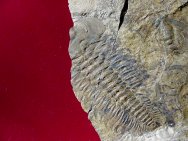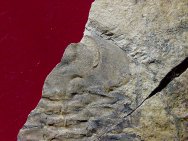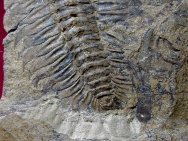Esmeraldina
/ Palmettaspis sp.



Name: Esmeraldina/Palmettaspis (not yet positively identified)
Trilobites Order Redlichiida, Suborder Olenellina, Superfamily
Olenelloidea, Family Holmiidae
Locality: Esmeraldina County, Nevada
Stratigraphy: Montenegro Member of the Campito Formation, Lower
Cambrian
Remarks: This specimen measures 8.5 cm, at the upper end of
range sizes. This specimen is tentatively identified as Esmeraldina
rowei (Walcott, 1910) - narrow form. There are three "forms" of
Esmeraldina rowei in this interval, the typical form, the narrow
form and a wide form.These were originally described these as three
separate species, but dividing a large collection of cephala into
separate species reveiled a continuum of diagnosed morphologies,
such
that separate species were not warranted. J. Stewart Hollingsworth
discussed the possible causes of this variability at length in a
paper,
eventually concluding that these forms may be resolved into separate
species, but it will likely take centimeter-scale collecting through
the trilobite interval to prove that there are distinct ranges within
the variants of E. rowei.
According to Hollingsworth "The
narrow form here has a simple pygidium as you have illustrated [the
typical and wide forms have pygidia with stronger pleural ribs sometimes
extending into blunt spines (See Fritz, 1995, fig. 6.12)]. The narrow
glabella is certainly reminiscent of the glabella configuration of
Palmettaspis consorta, hence the early confusion Bill Fritz and I
had with this form, but the glabella extends to the anterior border
without a distinct preglabellar field. The border is stronger, and
more elevated. Also the cephalon has a sculpture of fine granules,
which are often coarser on the other forms of E. rowei. An illustration
of these variations within E. rowei and a distinct new species (named
in my article now in press) of Esmeraldina from the same beds (E.
elliptica) is attached. This specimen has an unusually nice throax
and it is not common to see the pygidium in place - it is often tucked
under.
Courtesy of: Richie Kurkewicz Pangaea
Trilobites